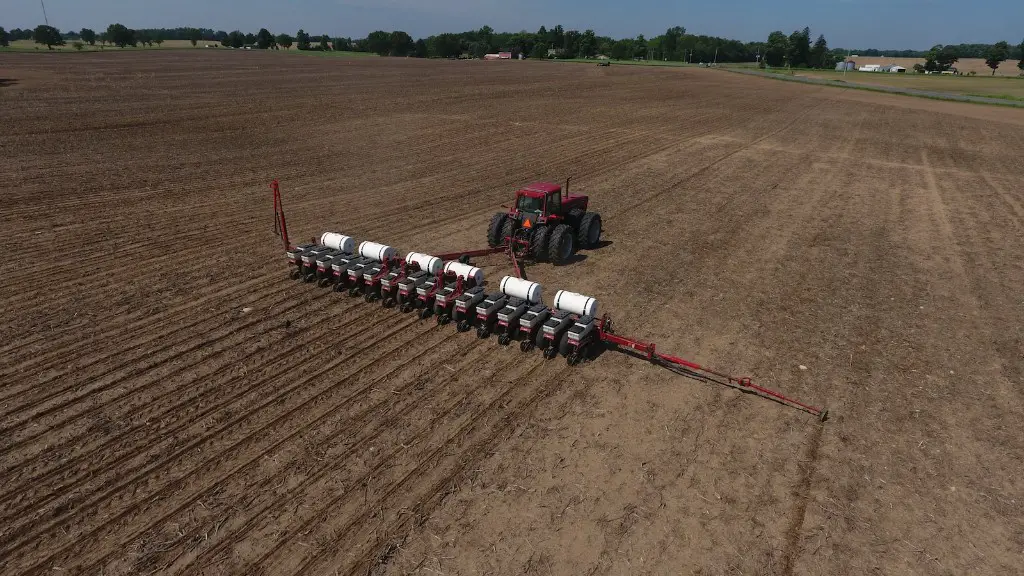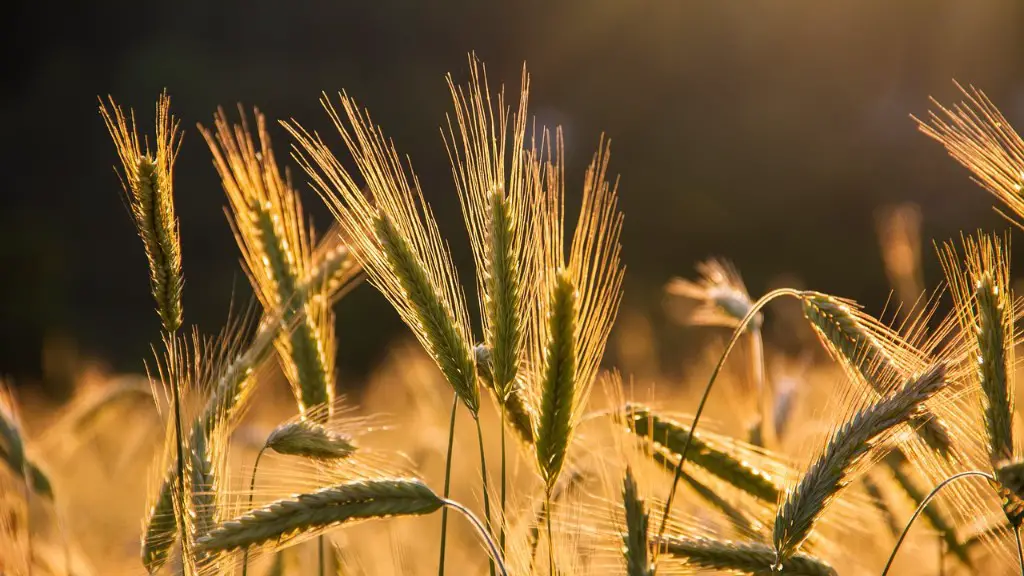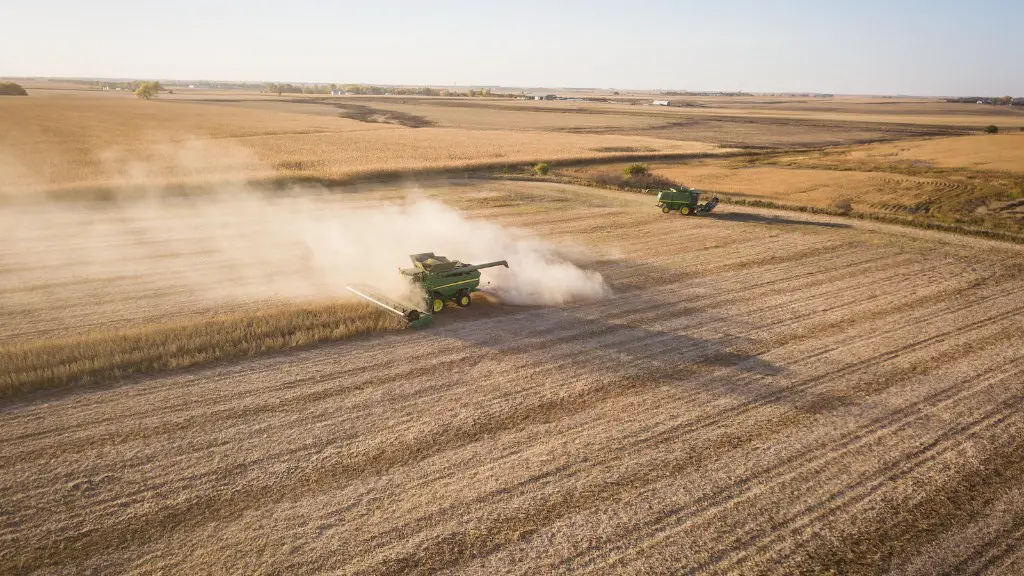Agriculture is a vital component of modern society and is essential for our survival today. It is responsible for providing us with food, fiber, and essential raw materials. Without it, we would not be able to survive and neither would the animals and plants. Here, we will look at some of the reasons why agriculture is so important.
Agriculture currently produces enough food to feed the entire world population. It provides food that is healthier and more nutritious, as well as vast amounts of fiber, wool, leather and other materials. It is responsible for the stability of food supply on a global level, and is needed to sustain a growing population.
Moreover, agriculture keeps the environment balanced. By preserving the land, it protects from erosion and thus helps maintain soil fertility. By producing plant life, it takes carbon dioxide from the air and releases oxygen in its stead. Furthermore, it is responsible for regulating populations of animals, providing us with important ecological benefits.
Agriculture is also essential for our economy. It contributes to economic growth and provides jobs for the entire world population. Moreover, it provides raw materials for the manufacturing industry and facilitating international trade. In addition, it provides opportunities for companies to innovate and develop new technologies and techniques to improve agricultural productivity.
Finally, agriculture is important for social development. It is responsible for providing education and skills to rural communities and helps foster economic development. It also helps to bridge the gap between urban and rural areas by providing employment, investments, and local and national markets.
The Impact of Agricultural Technologies on Agriculture
Agriculture technologies are transforming the face of agriculture. Technologies such as precision farming, artificial intelligence, machine learning, and advanced sensors, have enabled farmers to increase yields, reduce costs, and boost quality. This has allowed farmers to increase their crop output, reduce waste, improve resource usage, and increase return on investment.
Moreover, these technologies allow farmers to monitor the progress of their crops with precision, enabling them to identify problems early on and take preventive action. This helps them to improve the yield of their crops and reduce loss due to pests and diseases. In addition, these technologies help farmers to manage their crops, soils, and other resources more efficiently, leading to increased farm productivity.
Furthermore, precision farming technologies are enabling farmers to reduce the amount of water and fertilizers used, leading to reductions in costs and improved environmental protection. Advanced automation of processes helps to improve labor productivity, reduce the cost of manual labor, and increase the reach of the agricultural industry. Technologies such as drones and robots are being used to monitor crops and provide farmers with real time information about the health of their crops.
Finally, these technologies have enabled farmers to access a wide range of information and analysis. They can use this data to make informed decisions about their crops, climate, soil quality, and other farming requirements. This helps to ensure that farming practices are sustainable, reducing environmental damage and helping to improve yields.
The Benefits of Organic Agriculture
Organic agriculture is an important aspect of modern agriculture, which is focused on producing food in a natural and environmentally-friendly way. The main objective of organic agriculture is to minimize the use of synthetic pesticides and fertilizers, while still meeting the requirements of the crop production. It is a relatively new form of farming, which has become increasingly important in recent years.
One key benefit of organic agriculture is that it helps to reduce the risk of food-borne illnesses. This is because organic farming does not use any synthetic substances, reducing the chances of contamination and increasing the safety of the food. It also reduces the risk of other health risks in the environment such as soil and water contamination.
In addition, organic farming is beneficial to the environment since it does not release any harmful toxins into the air or water. As a result, it helps to reduce the amount of air pollution and water pollution which can have serious consequences. It is also beneficial to the farmers since it requires less input and reduces the costs associated with farming.
Moreover, organic farming is beneficial for the economy since it helps to stimulate economic growth. Organic farmers are able to market their products as being healthier, which can increase the demand for these products. This leads to increased revenues, jobs, and incomes, creating a beneficial impact on the economy.
Finally, organic farming is beneficial in terms of the health and well-being of the farmers. It allows them to work with natural resources, reducing the exposure to toxic chemicals and other hazardous materials. This reduces the risks to these farmers and increases their productivity, further contributing to economic development.
The Role of Sustainable Agriculture in Ensuring Food Security
Food security is an important global concern that creates universal access to safe, nutritious, and affordable food for everyone. Sustainable agriculture is a key tool for achieving this goal, as it helps to ensure food security in a cost-effective and environmentally-friendly way. Sustainable agriculture employs techniques and technologies that help to reduce resource depletion and environmental degradation, while maintaining a reliable food supply.
Sustainable agriculture helps to ensure food security by reducing the cost of food production. It reduces the cost of inputs and labour, while also increasing yields and nutritional value. This helps to improve the affordability and availability of food, reducing the risk of food insecurity in low-income families and countries. It also helps to reduce water and soil pollution, promoting natural habitats and encouraging biodiversity.
In addition, sustainable agriculture helps to improve food safety. By employing sustainable practices, farmers can reduce the risk of foodborne illnesses and contamination. This is due to their focus on organic farming and minimization of chemical additives. By increasing the safety of food, sustainable agriculture ensures that food is safe for consumption and minimizes health risks.
Moreover, sustainable agriculture is important for mitigating climate change. By reducing the use of chemical fertilizers and pesticides, sustainable practices can help to reduce emissions of greenhouse gases. This helps to reduce the global effects of climate change, ensuring a secure future for generations to come.
Finally, sustainable agriculture is important for social development. By providing employment and income opportunities in rural areas, sustainable farming contributes to long-term economic development. This reduces poverty, improves the quality of life of local communities, and creates a more equitable and sustainable society.
The Importance of Water Management in Agriculture
Water management is an important element of modern agriculture. By efficiently managing water resources, farmers can increase their yields and reduce environmental damage. Water management also helps to conserve water, reduce water losses, and improve water quality.
Water management helps to ensure that water is used efficiently and not wasted. This helps to reduce the amount of water lost through evaporation and runoff, and ensure that water is stored for future use. Moreover, water management helps to reduce water pollution, as it ensures that water is not contaminated by agricultural chemicals and other pollutants. Furthermore, by adjusting irrigation techniques, farmers can reduce the amount of water used and save energy costs associated with pumping and evaporation.
In addition, water management helps to improve crop yields. By ensuring that water is available when needed, farmers can increase the yield of their crops and reduce loss due to drought. This helps to increase the revenue of farmers and contribute to food security.
Moreover, water management helps to reduce the risk of flooding. By efficiently managing watersheds, farmers can reduce the risk of flooding and minimize the damage caused. This helps to protect the environment and local communities from the effects of floods.
Finally, water management is important for promoting the conservation of natural habitats. By improving the efficiency of water use, farmers can reduce the amount of water taken from natural water systems and reduce the damage caused to these habitats. This helps to promote biodiversity and environmental protection.





